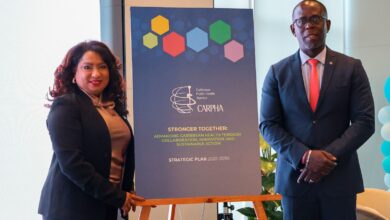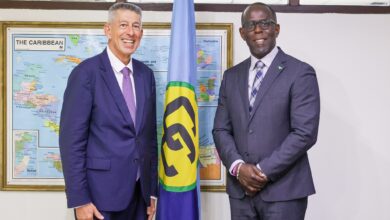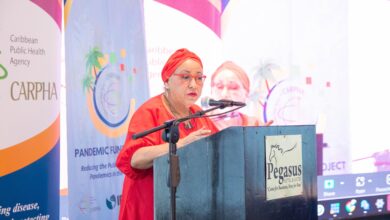CARICOM Secretariat, Turkeyen, Greater Georgetown, Guyana) Under the theme CARICOM Reflects…Never Forget, The Caribbean Community Secretariat (CCS) in the second of a series of activities to mark the beginning of the 200th Anniversary year of the Abolition of the Trans-Atlantic Slave Trade, hosted a distinguished lecture presented by highly acclaimed Surinamese author and historian, Cynthia McLeod on the topic: Elisabeth Samson: The Role and Position of Women in the Caribbean during Slavery, at the CARICOM Secretariat on Tuesday, March 27, 2007.
Ms McLeod was introduced by Ms Valerie Taylor, the Secretariat’s Senior Project Officer in Education, as the daughter of the first President of Suriname, Hon. Johan Ferrier. She has written several compelling historical novels and invested 13 years of historical research in writing the novel The Free Negress Elisabeth – Prisoner of Color – first published in 2000 – on which the lecture was based. The novel chronicles the life and experiences of the intriguing personality of Elisabeth Samson, who during slavery was a free black woman envied for her enormous wealth, intelligence and beauty.
In setting the context for the lecture, Secretary General of the CARICOM Secretariat, Dr Edwin Carrington applauded Suriname as the “beating heart of the Amazon” and pointed to its many languages and rich cultural diversity, which he recalled were all showcased at regional and international fora.
The Secretary General reiterated the need for CARICOM to develop programmes in accordance with the 2006 United Nations Resolution and the mandate of the Eighteenth Inter-Sessional Meeting of CARICOM Heads of Government to educate future generations on the lessons, history and consequences of slavery and the slave trade. In welcoming Ms McLeod, Dr Carrington asserted that the lecturer, in her novel, had challenged the colonial masters on their views and laws on slaves and especially on black women “in a society dominated by white males and characterised by cruel oppression of Africans.”
In what was generally considered an exciting and fascinating yet scholarly historical presentation, Ms McLeod, a humorous and engaging story-teller, held her audience captive as she took them back in time to 1764 when the black protagonist of her book, the inimitable Elisabeth Samson had the temerity to seek permission to marry a white man in a Surinamese society that had passed laws to prohibit such an ‘atrocity.’
The lecturer captured a comprehensive socio-historical context in which her novel was set and provoked the thoughts of her audience on issues such as colour, language and identity, miscegenation, the struggle for love, acceptance and respect as well as the right of free black women to acquire or inherit wealth. Her findings also challenged the colonial view on black women in a white male dominated society.
Having painted a picture of Suriname in the 18th Century as a conundrum of race relations and a society in which there seemingly was a dearth of white females, Ms McLeod emphasised the point that miscegenation was inevitable and that not all enslaved women were victims of their white masters’ ravishing lust but that some slaves and their masters actually had consensual sex in the context of a love relationship. In the same vein, she added that not all black slave women were powerless or were victims, as her protagonist was not only a rich heiress, but owned plantations and slaves.
Her findings also indicated that the relationship between blacks and whites was much more complicated and complex than a rigid code of race relations suggested.
According to Ms McLeod, her research work and findings “have salvaged the remarkable person of Elisabeth out of the sphere of the helplessly forlorn and pitied black mistress who inherits the fortunes of her industrious white master.” She hastened to point out that the historical records showed that Elisabeth had not only inherited her wealth but was an astute businesswoman who actually amassed her fortune through several business enterprises. Elisabeth issued loans to whites and it was her white husband who eventually inherited her wealth, in the absence of any offspring.
In making the acknowledgements, Ms Sharlene Shillingford-McKlmon, Special Assistant to the Assistant Secretary General, Regional Trade & Economic Integration, asserted that the very things, which once served to divide us were the things which have also brought us together as a Community. She averred that if the Community continued to believe in and remained committed to the principles of unity and integration, “we can accomplish meaningful things in the spirit of our ancestors who against all odds had the audacity to live, to hope and not just to survive, but to achieve.”
The Special Lecture was attended by several Government Officials of Guyana including the widow of the late Dr Cheddi Jagan, Mrs Janet Jagan and representatives of the academic community.
As the Commemoration continues, a series of other activities have been planned for the year, by Member States as well as by the CARICOM Caucus of Permanent Representatives at the United Nations. This series include lectures, exhibitions, panel discussions and special ceremonies of commemoration.





